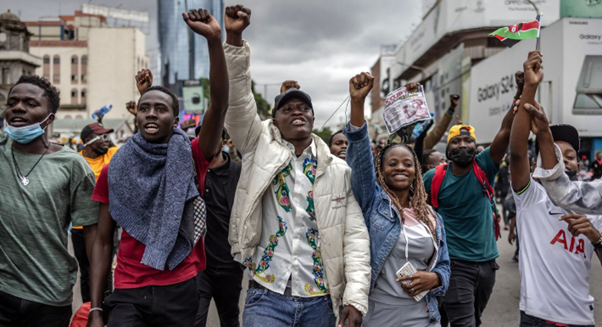Angry gen Z : the legitimate call of an ignored african youth
From Nairobi to Antananarivo, via Rabat, Generation Z is mobilizing peacefully to demand jobs and better living conditions. These young people, increasingly connected and better educated, are denouncing the growing gap between economic growth and the real opportunities available to them. In response to their demands, authorities’ reactions too often remain inadequate, fueling frustration and social tension.

In Africa, youth is not asking for the impossible. They are simply claiming their share of the future: stable employment, decent working conditions, the chance to build their lives, and to contribute to their country’s development. Yet in many cities across the continent, protests erupt—peaceful, organized, and often widely covered by social media—and encounter inappropriate responses from authorities.
How can we blame them for demanding a dignified and fair future?
From Kenya to Morocco, from Togo to Madagascar, these young people of the new Generation Z are better informed, more connected, and more demanding. Increasingly educated, globally aware, hyper-connected, they know their rights, are aware of the opportunities offered by growing economies, and no longer hesitate to make their voices heard. How can we blame them for demanding a dignified and fair future when the economic growth of their countries struggles to translate into concrete jobs and tangible opportunities?
Ignoring these voices compromises the continent’s development
The problem does not lie in their mobilization, but in how it is received. Too often, authorities respond either repressively or indifferently. Instead of engaging in dialogue, understanding frustrations, and channeling these movements into a positive impulse for society, young people are stigmatized and silenced. Yet this generation represents a wealth of potential: creative, educated minds, globally minded, capable of driving economic and social change. Ignoring these voices is not only inhumane but also jeopardizes the continent’s development.
Current protests are a clear signal: legitimate anger must be turned into concrete, inclusive policies
The numbers speak for themselves: around 23.29% of young people aged 15 to 24 are neither employed, in school, nor in training. These statistics reflect a stark reality: despite higher levels of education, African youth struggle to access the labor market.
Investing in youth is investing in the future. This requires structural reforms, massive creation of quality jobs, development of human capital and skills, innovation, and support for young entrepreneurs. Current protests are a clear signal: it is urgent to turn legitimate anger into concrete and inclusive policies.
Generation Z is not a problem to manage, it is an opportunity to seize
Generation Z is not a problem to manage, it is an opportunity to seize. African governments must listen, engage in dialogue, and act. Youth is simply demanding what every citizen should be able to expect: a dignified future, the chance to work, and to contribute to society. Treating them with respect and responsibility is the only way to build a prosperous, stable, and truly inclusive Africa.
Turning anger into hope
In Madagascar, protests—violently repressed—achieved results with the president’s departure, as the army sided with the street. Nothing is guaranteed, however: the challenge remains to transform this anger into concrete, lasting action. A few years ago, young Tunisians transformed the face of their country—and part of the world—by removing Ben Ali and the dictatorial system that blocked their future aspirations. Today, a few months before the anniversary of the Tunisian revolution, many denounce a “confiscated” revolution, as youth were not fully integrated into the country’s reconstruction. Ignoring this generation is leaving a ticking time bomb ready to explode instead of turning it into a force for the future.






